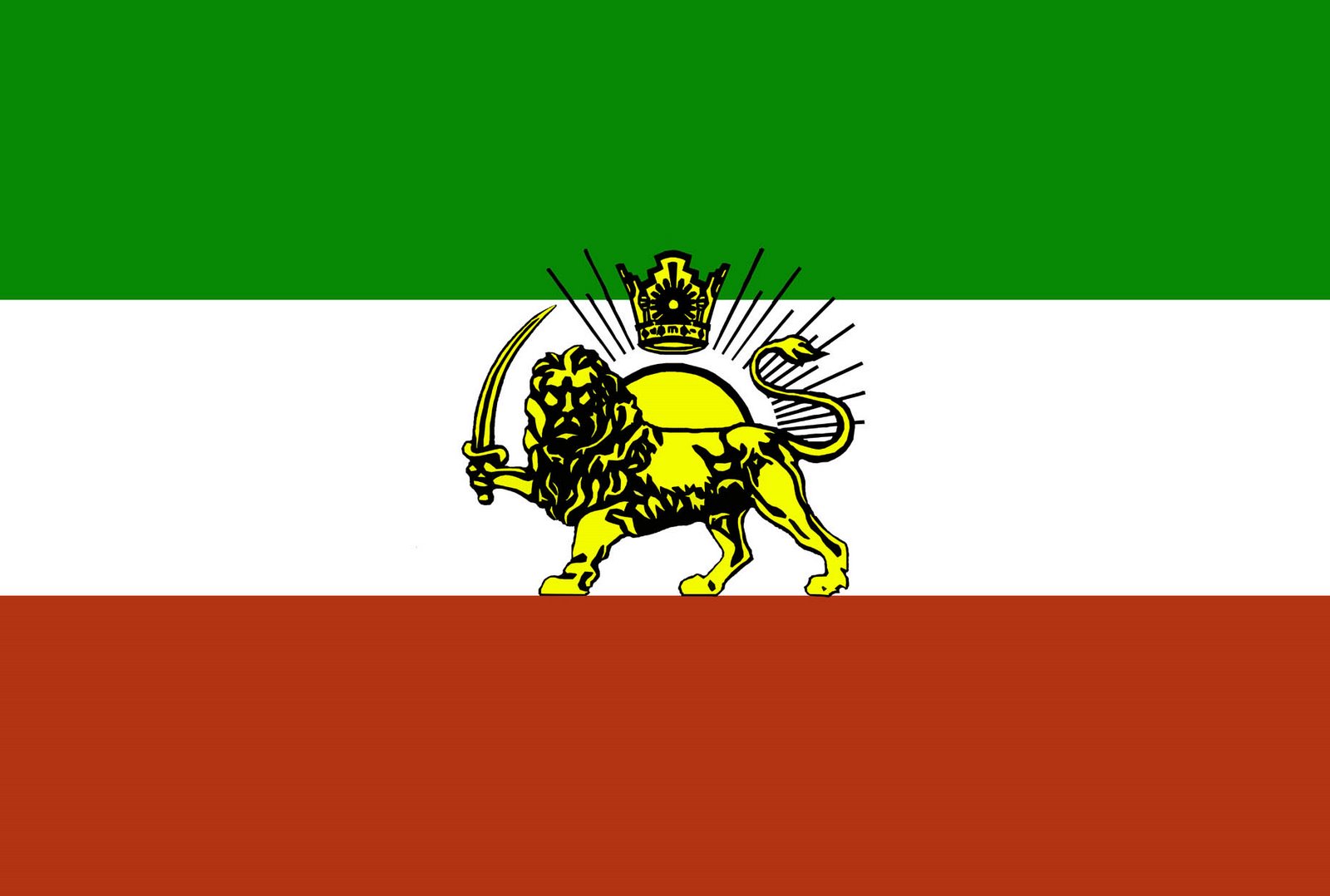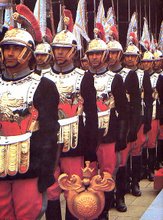
This exceptional solider of Iran deserves an entry for himself. Whenever the nation's security was in danger, General Zahedi was there to defuse it - a true Iranian hero!
***************
Mohammad Fazlollah Zahedi (1897-1963) was an Iranian general, Prime Minister, and politician.
Born in Hamedan in 1896, he was the son of Abol Hassan "Bassir Diwan" Zahedi, a wealthy land owner at the city of Hamedan, Fazlollah Zahedi was appointed general of the Iranian army at the age of 25. During his service at the Imperial Russian-trained Iranian Cossack Brigade, one of his comrades in arms (his superior in fact) was Reza Khan, the later Reza Shah Pahlavi. The alliance, forged between the two men, was to endure a lifetime and continued to bind their sons, personally as well as politically.
He served under Reza Pahlavi in the army later on, and was among the officers dispatched to Gilan who put an end to the Constitutionalist movement of Gilan of Mirza Kuchak Khan.
He was also involved in the overthrow of Seyyed Zia'eddin Tabatabaee's government in 1920. It was Colonel Zahedi who arrested Sheikh Khaz'al Khan and brought him to Tehran.
During Reza Shah's reign, General Zahedi was named (1926) military governor of Khuzestan province, holding the hub of Iran's oil industry, and in 1932 chief of national police, one of the nation's top internal posts. During World War II he was appointed (1941) commanding general of the Isfahan Division. Subsequent to the forced abdication of Reza Shah (1941), fuelled by British fears of an Alliance with Nazi Germany, Zahedi was arrested by British forces in 1942 for the same reasons, flown out of the country and interned in Palestine until the end of the war. A fierce nationalist, Zahedi fostered deep reservations and suspicions towards the Allied Forces.
Returned from exile in 1945, during the reign of Mohammad Reza Shah (Reza Shah's son and successor), General Zahedi became Inspector of military forces in southern Iran. He became once more chief of national police (Shahrbani) in 1949, when Mohammad Reza Shah appointed him as chief of the Shahrbani Police Forces, in order to counter the growing threat of Sepahbod Haj Ali Razmara.
After retiring from the army, he was named Senator in 1950. During Hossein Ala''s Premiership Zahedi held the Post of Minister of the Interior (1951), which he retained during the initial period of Dr. Mohammad Mossadegh's tenure. While Zahedi actively backed Mossadeghs nationalisation of Iran's oil industry, a move that antagonised the United Kingdom and the Western Powers, he was at odds with him over Mossadeghs increasing tolerance for the outlawed communist party Tudeh, which had seized the opportunity and boldly demonstrated for Iranian rights to its national resources. Zahedi finally fell out with Mossadegh, who accused him of fostering coup plans. Iran's oil-exports came to a standstill due to sanctions levied by the Western Powers, leading to considerable economic hardships at home, with painful impacts on the labour force. Riots by several tribes of southern Iran and destitute oil-field workers destabilised public life further and demands for political change grew nationwide. The USA, who had held "Mossy", the ailing and previously staunchly pro-American Dr. Mossadegh in high esteem, were fearing increasing communist influence over the situation and dropped their support for him.
As a result of the ensuing international crisis and Iran's political destabilisation, the Shah, encouraged by leading figures, in February of 1953 asked Prime Minister Mossadegh to resign,. Mossadegh refused to abide by the constitutional rights of the sovereign to dismiss him, provoking a national uprising. During a restive interlude Zahedi acted from underground in order to avoid imminent arrest. Shah supporters crowded the streets, calling for the Premier's ousting. Rebellious groups engaged in street-fights with forces loyal to Prime Minister Mossadegh as well as rallying members of the Iranian communist party "Tudeh" (the name implying "Masses").
In August of 1953 Mossadegh attempted to convince the Shah to leave the country. The Shah refused, and formally dismissed the Prime Minister, in accordance with the foreign intelligence plan. Mossadegh refused to resign, however, and when it became apparent that he was going to fight, the Shah, as a precautionary measure foreseen by the British/American plan, on 15th August flew to Baghdad and on from there to Rome, Italy, after hesitantly signing two decrees, one dismissing Mossadegh and the other nominating General Fazlollah Zahedi Prime Minister, subsequent to pressure from the US and UK intelligence agencies. By unconstitutionally refusing to cede power to his destined successor, subsequent to the Shah's dismissal, and foiling attempts to remove him by force, Mossadegh had factually staged a coup d'Etat.
Supported by the politics of the United Kingdom and the USA, and encouraged by the intelligence agents Kermit Roosevelt and Donald N. Wilber, General Fazlollah Zahedi staged a counter coup, drawing public and military support, which succeeded on the 19 August 1953. Legitimised by the Shah's decree, thousands of copies of which were publicly distributed as flyers, Zahedi proclaimed himself Prime Minister and the Shah returned triumphantly to Iran, from his brief exile in Rome, on the 22nd of August.
Many contemporary sources attribute the instigation of the counter coup entirely to foreign intelligence agencies, such as the U.S. American CIA ("CIA Coup") and the British MI6. Numerous books were published on the events surrounding the counter coup, often mixing facts and fiction. Sober reflection sheds due scepticism on assertions that two foreigners and a few local cooperators should have arbitrarily manipulated masses of (traditionally xenophobic) Iranians into action. In light of the fact, e. g., that the CIA later claimed to have lost all documentation relating to the coup events of 1953 in a fire, circulating narrations (often self-congratulatory) of alleged participating agents and other "insiders" need be regarded with due caution.
Having acquired an unprecedented power-base and, as a consequence, evoking increasing unease at home, the Premiership of General Zahedi ended in 1955. His final exile was sweetened by his last post, as Ambassador to the United Nations, in Geneva.
Zahedi's family descends from the Sufi mystics Sheikh Zahed Gilani (1216 - 1301) and Sheikh Safi Al-Din Ardebili, the eponym of the Safavid Dynasty. Through his mother, Djavaher Khanom, he traced his descent to the dynastic ruler Karim Khan Zand. Married to Khadijeh Pirnia, daughter of Mirza Hussein Khan Pirnia (titled Motamen-ol-Molk), and granddaughter to Mozzafar-al-Din Shah Qajar (1853 - 1907), Fazlollah Zahedi had a son, Ardeshir, and a daughter, Homa.
His son Ardeshir Zahedi, a later politician and diplomat, was to marry Princess Shahnaz Pahlavi, daughter of Mohammad Reza Pahlavi from his first marriage to Princess Fawzia of Egypt, daughter to King Fuad I.
























No comments:
Post a Comment